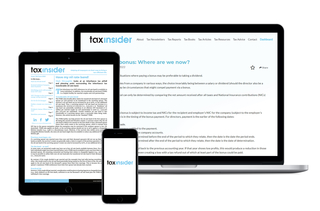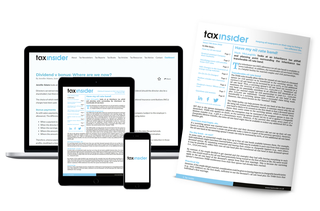New articles published
in February 2026
-
Tax and Romance: Tax-Efficient Planning for Couples
Tax and romance – not exactly the perfect match! However, in this Valentines season, the thoughts of the lovestruck (but fiscally frugal!) may turn to sharing their caring nature in a tax-efficient way.
Mark McLaughlin offers some tips for (tax-conscious!) romantic couples.
-
Interest Income: How It Is Taxed for UK Individuals
Interest income for UK individuals can arise from a variety of sources, including (but not limited to) savings accounts, current accounts, fixed-term deposits, corporate bonds, government gilts, peer-to-peer lending platforms, and some unit trusts.
Richard Curtis looks at how interest income is taxed on UK individuals.
-
VAT on Overseas Goods: Place of Supply and Tax Treatment
The basic rule for considering the place of supply of goods is that they are supplied where they are physically located when they are sold or allocated to the customer.
In the simplest scenario, goods located in the UK at the time they are supplied to a customer are treated as supplied in the UK and subject to UK VAT. If the goods are exported from the UK, they can be zero-rated but the supplier has to fulfil certain criteria in terms of obtaining and retaining export evidence, etc.
Andrew Needham looks at VAT consequences of buying and selling goods that are located overseas.
-
Loans to Participators: An Increase in the Section 455 Charge
There is a corporation tax (CT) charge (CTA 2010, s 455) on loans made to ‘participators’ in close companies that are outstanding at the end of a CT accounting period (CTAP).
This charge used to be at a fixed rate, which Chancellors changed from time to time. However, some years ago George Osbourne altered this principle (in FA 2016, s 50), instead setting the rate at ‘such percentage of the amount of the loan or advance as corresponds to the dividend upper rate specified in section 8(2) of ITA 2007 for the tax year in which the loan or advance is made’.
Kevin Read outlines an upcoming increase in the tax charge under the ‘loans to participators’ provisions for companies.
-
Pensions and Tax Relief: Key Rules and Planning Points
Most people know the importance of saving for retirement. The tax relief on pensions is designed to encourage us to save more.
The government encourages us to save for our retirement; auto-enrolment makes it easy for employees to join pension schemes, and contributions are very tax-efficient. The introduction of lifetime individual savings accounts in 2017 was an additional tool to encourage us to save for the future.
Tristan Noyes looks at some key tax rules and important points to remember on pensions.
-
Lending to a Company for Shares: Key Tax Implications
Setting up in business can be expensive, and some entrepreneurs may not have the wherewithal to fund the full cost.
Loans and grants are available from various sources, including banks and the government, but only up to a set amount, which may not be enough to cover start-up costs, day-to-day running of the business for the first few months and personal living costs before the business brings in money. For example, government start up loans allow borrowing between £500 and £25,000 at a fixed interest rate of 6% per year, repayable over one to five years.Jennifer Adams considers important implications of lending money to a company in exchange for shares.
-
Real Property and Tax: Buying, Holding and Selling
Whilst cars, boats and horses are expensive to buy and keep, often those are tax-free upon sale, whereas land and buildings (or ‘real property’) are taxed at every turn.
Chris Thorpe outlines the taxes involved with buying, holding and selling real property.
-
Q&As with Arthur Weller
Some of our most popular articles
-
Tax implications of awarding shares to family members
The employment-related securities legislation deals with arrangements involving shares and securities provided by reason of employment where the full value of the employment reward provided to the employee is not included in the salary package and is charged to tax.
Jennifer Adams considers the tax implications of shares in a family company being awarded or gifted to family members of employees.
-
Decisions, decisions! Partnership or limited company?
A sole trader looking to expand their business might be weighing up the ‘pros’ and ‘cons’ of a partnership or a limited company. They are very different, with not only very different tax consequences, but functions as well.
Chris Thorpe looks at partnerships and companies and considers which business model might be best.
-
Don’t write off your chances of tax relief!
Under the loan relationships rules for companies, debits on loan arrangements are not deductible for corporation tax purposes in some circumstances.
Kevin Read highlights a recent case concerning the loan relationship rules for companies.
-
Who has tipped HMRC off?
When HM Revenue and Customs (HMRC) opens a tax return enquiry, the natural reaction of most taxpayers is to speculate about the reason why their tax return has been selected. In fact, HMRC does not need an excuse to open a tax return enquiry; a small proportion of tax returns are simply selected at random. .
Mark McLaughlin looks at whether a taxpayer can find out if an HMRC enquiry has been opened as the result of an accusation made by a third party.
-
Remuneration in 2024/25 - Important Considerations
When considering the tricky matter of remuneration planning, there are two things to consider; the amount of remuneration, and what form it takes.
Chris Thorpe looks at what to watch out for with regard to paying employees and directors.
-
Alternative ways of paying staff tax-efficiently
Despite the reduction in National Insurance contributions (NICs) in Spring Budget 2024, more employees are paying tax at higher rates on their earnings due to the freezing of tax thresholds. Some may find that any pay rise or bonus attracts additional tax and NICs such that the net pay increase is minimal.
Jennifer Adams looks at some alternatives to rewarding an employee with a pay rise or a bonus.
-
A popular ‘exit’ strategy when a shareholder is retiring
Mark McLaughlin looks at company purchases of own shares and warns not to become too focused on the more difficult rules for capital treatment.
A company purchase of its own shares from a shareholder is a popular ‘exit’ strategy when an individual shareholder is retiring, or a dissenting shareholder is departing.
-
Q&As with Arthur Weller
Subscription Benefits
We asked our subscribers what they love about Tax Insider.
These are the top 7 reasons that they gave us:
Monthly Newsletter
Tax Insider…





